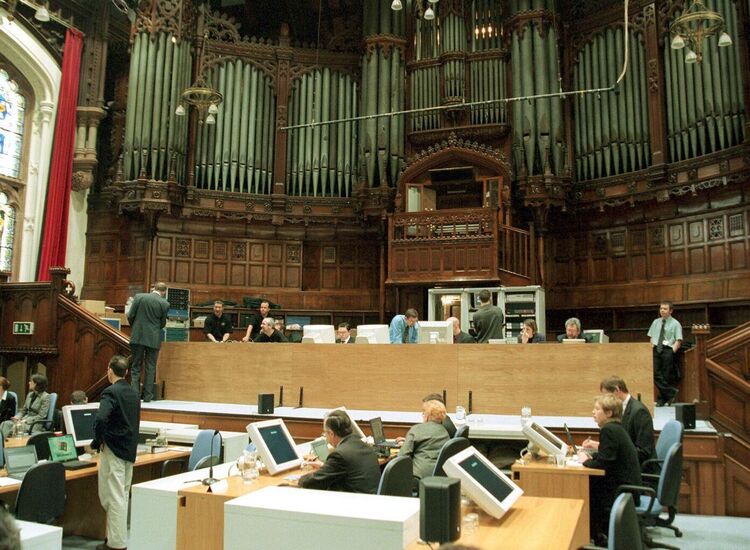Page Turner / Edited by Peter McDermott
Costello, Mary (c) Martina Kenji
Mary Costello.
PHOTO BY MARTINA KENJI
Last year, Mary Costello joined the ranks of Irish writers who’ve made an immediate impact with a first novel. Indeed, “Academy Street” was shortlisted for the Costa First Novel Award (open to writers based in Britain and Ireland), with the judges calling it a “remarkable debut with a transcendent, quiet power.”
A previous Costa winner, Maggie O’Farrell, said: “I read ‘Academy Street’ cover to cover in one night, unable to stop. It is a short novel about a long life, stretching from rural Ireland to post-9/11 New York, and brings to mind the elegance of Colm Toíbín and the insight of Alice Munro.”
Munro’s fellow Nobel Prize-winner J.M. Coetzee said: “With extraordinary devotion, Mary Costello brings to life a woman who would otherwise have faded into oblivion amid the legions of the meek and the unobtrusive."
Its author summarized “Academy Street” thus: “It’s the story of one ordinary woman’s life in New York played out over the second half of the 20th century. It opens in 1944 in a big old house in the west of Ireland called Easterfield. Tess Lohan is 7 when her life is suddenly ruptured by the death of her mother.
“Later, Tess trains as a nurse in Dublin and, in the early ’Sixties, emigrates to New York. She lives in an apartment on a street in Inwood, Academy Street. She has a brief calamitous love affair which results in a son, Theo. The novel follows her life as a nurse and mother over the next four decades. It’s a life that is touched by joy and marked by fate and by Tess’s perpetual ache for home and belonging.”
Costello added about the novel that has just been published in this country: “There’s a family resonance to this story. My mother grew up in a big old house in Galway, and I modeled Easterfield on that house. When she was 3, her mother died suddenly. My mother never emigrated, but her sister Carmel did. She nursed in Manhattan in the early ’Sixties and lived in a flat on Academy Street. While I borrow details from her life, my character Tess is a fictional creation and her interior life is entirely her own.”
Mary Costello was a teacher up until 2011 when her first book, “The China Factory,” was published.
“I started writing short stories way back – in my early 20s,” she recalled. “Two of them were published, but then I didn’t really persist in sending work out after that. I’d gotten married and was teaching fulltime and gradually writing slipped to the margins of my life.
“But stories would still brim up and I’d write them. I didn’t welcome writing – I felt it as an interruption, a burden, a secret even, and I tried to give it up. I just wanted to be normal like my sisters and friends. But it wouldn’t go away,” Costello said. “I didn’t know any writers and wasn’t part of any writing community, so I was writing in isolation. My marriage broke up after 10 years, but I kept writing – and I was teaching fulltime. Then, into my 40s, I sent some stories out to the Stinging Fly, a literary magazine and publisher in Dublin, and they liked them and wanted to publish them – which is how my first book came about.”
Mary Costello
Place of birth: Galway
Residence: Dublin
Published works: “Academy Street,” “The China Factory” – a collection of short stories.
What is your writing routine? Are there ideal conditions?
I work best in the mornings, typically from about 9-1 p.m., and if the work is going well I’ll return to it in the afternoons. When I’m rewriting I work at night too. I always have notebooks on the go so, in a way, a writer is never not working.
Ideally I need a quiet familiar place, with my books nearby. Stability is important. I like to know I have a block time ahead– months preferably – free of travel or work commitments.
What advice do you have for aspiring writers?
Read your favorite writers closely. Trust your own voice. Be patient.
Name three books that are memorable in terms of your reading pleasure.
”Housekeeping” by Marilynne Robinson; “Elizabeth Costello” by J.M. Coetzee; “Dept. of Speculation” by Jenny Offhill.
What book are you currently reading?
“With Borges on an Ordinary Evening in Buenos Aires,” a memoir by Willis Barnstone.
Is there a book you wish you had written?
“Housekeeping” by Marilynne Robinson.
Name a book that you were pleasantly surprised by.
Ben Lerner’s latest novel, “10:04.”
If you could meet one author, living or dead, who would it be?
Albert Camus.
What book changed your life?
No book ever changed my life but all of J.M. Coetzee’s rocked my world.
What is your favorite spot in Ireland?
My childhood bedroom in east Galway.









